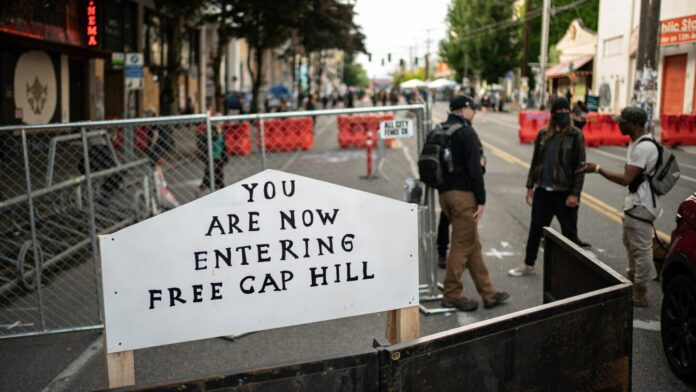In the four days since the Seattle Police Department vacated its East Precinct building and a leaderless congregation of activists established the police-free “Capitol Hill Autonomous Zone” — or CHAZ — across four blocks outside, the largely peaceful demonstration has forced activists and city officials to grapple with questions of accountability, leadership and what comes next.
The struggle comes as a larger conversation plays out nationally over how communities want to change — and in some cases eliminate — the traditional policing model. Meanwhile, President Trump and his allies are decrying such protests and calls to defund police as a breakdown in lawful society.
Trump has lashed out at Washington Gov. Jay Inslee and Seattle Mayor Jenny Durkan, both Democrats, over the situation in Seattle and implied he would end the demonstrations with military force — something both Inslee and Durkan have said is unconstitutional and illegal.
On Friday, Trump seized on comments Durkan made during a Thursday appearance on CNN when she joked, replying to a question of how long the zone could resemble its current state: “I don’t know. We could have the summer of love.”
In a tweet, Trump characterized the four-block demonstration as an “anarchist takeover” of the city and implied that the protesters were destructive terrorists.
“These Liberal Dems don’t have a clue. The terrorists burn and pillage our cities, and they think it is just wonderful, even the death,” Trump wrote. “Must end this Seattle takeover now!”
“We did not abandon the precinct, but we had to remove personnel for a short period of time,” Best said. She declined to directly address the accuracy of Trump’s claim from the day before that “domestic terrorists” have taken over Seattle.
“I don’t get involved in the politics; I let the politicians do that,” Best said, adding that it’s now taking officers three times as long to respond to priority calls since they’re unable to use the precinct building.
Reports from the scene and comments from other city leaders undercut the president’s narrative that the autonomous zone is rife with mayhem.
Best noted that the activity in the autonomous zone has been peaceful, with people holding potlucks, displaying Black Lives Matter paintings and screening movies.
“The Capitol Hill Autonomous Zone #CHAZ is not a lawless wasteland of anarchist insurrection — it is a peaceful expression of our community’s collective grief and their desire to build a better world,” Durkan tweeted Thursday. “Given his track record, it’s not hard to believe that Trump is wrong, yet again.”
On the ground Thursday, the scene was a mix of demonstration and street fair, The Post reported. The John Brown Gun Club, which provides armed community defense during social justice events, was on site but with no weapons visible. One person, who was not a member of the club, was seen with a long gun; while Washington is an open-carry state, Durkan has banned weapons in the city since a May 30 emergency order.
Heated conflicts were usually de-escalated, with a particularly tense moment coming after a black activist escorted several Seattle Police Department officers into their boarded-up precinct building as other activists objected.
The Seattle Times reported there was at least one confrontation Thursday evening around 6 p.m. when protesters accused officers of firing pepper spray at them.
“I heard people yelling, and saw some shoving, but it was hard to see exactly what was happening,” Zachary Coon, a tech engineer volunteering at the autonomous zone, told the Times. “A couple of people claimed later they were pepper-sprayed.”
But from within the demonstration and from outside, it’s not always clear who is in charge. As Durkan vows to move forward observing the protesters’ First Amendment rights while also reopening the precinct station, neither she nor Best has said who gave the order Monday for police to leave the precinct in the first place.
For occupants of the CHAZ, it’s unclear how long they will stay and what they will consider a fulfillment of their various demands, which in some forms number as many as 30.
There’s also no clear picture of how widely encompassing the protest will be and whether it will focus on police brutality against black residents, or include wider protests of systemic inequality regarding housing, health care and education that have beset Seattle for years.
Gregory Scruggs in Seattle contributed to this report.






